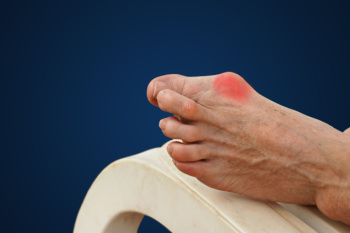
A bunion is a bony prominence that forms at the base of the big toe, often resulting from an imbalance in foot mechanics. Common causes include genetics, wearing tight or ill-fitting shoes, and certain foot conditions like arthritis. Symptoms typically include swelling, redness, and pain at the bunion site, along with difficulty in finding comfortable footwear. The big toe may also drift toward the other toes, increasing discomfort. To diagnose a bunion, a podiatrist will conduct a physical examination, assessing the foot's alignment and range of motion. X-rays may be ordered to evaluate the extent of the deformity and rule out other conditions. Early diagnosis is essential, as timely intervention can help manage symptoms and prevent the bunion from worsening, allowing individuals to maintain an active lifestyle without pain. If you have a bunion, it is suggested that you schedule an appointment with a podiatrist who can provide treatment.
If you are suffering from bunion pain, contact one of our podiatrists of Cleveland Foot & Ankle Clinic. Our doctors can provide the care you need to keep you pain-free and on your feet.
What Is a Bunion?
Bunions are painful bony bumps that usually develop on the inside of the foot at the joint of the big toe. As the deformity increases over time, it may become painful to walk and wear shoes. Women are more likely to exacerbate existing bunions since they often wear tight, narrow shoes that shift their toes together. Bunion pain can be relieved by wearing wider shoes with enough room for the toes.
Causes
- Genetics – some people inherit feet that are more prone to bunion development
- Inflammatory Conditions - rheumatoid arthritis and polio may cause bunion development
Symptoms
- Redness and inflammation
- Pain and tenderness
- Callus or corns on the bump
- Restricted motion in the big toe
In order to diagnose your bunion, your podiatrist may ask about your medical history, symptoms, and general health. Your doctor might also order an x-ray to take a closer look at your feet. Nonsurgical treatment options include orthotics, padding, icing, changes in footwear, and medication. If nonsurgical treatments don’t alleviate your bunion pain, surgery may be necessary.
If you have any questions, please feel free to contact our offices located in Cleveland, Independence, and Kent, OH . We offer the newest diagnostic and treatment technologies for all your foot care needs.
